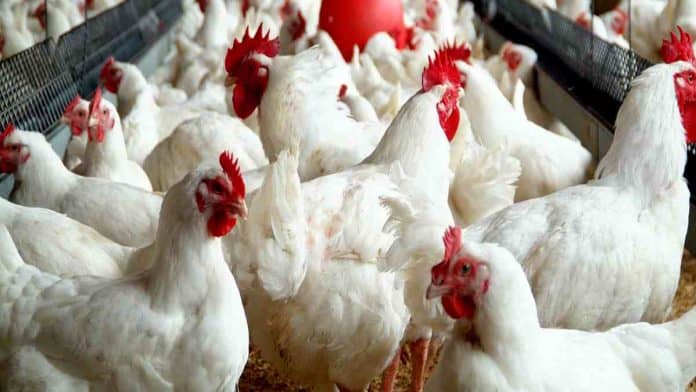Are you thinking of starting a farming business in Nigeria?
I will not blame you if the first idea that comes to your mind is starting a poultry farm, farming domesticated birds for meat or eggs production.
You see, poultry farming is by far the most established and lucrative animal farming business idea in Nigeria. I use the word established deliberately, in the sense that poultry products’ interest and consumption continue to increase, making it the most common source of protein/ meat production besides fish, pork, and beef.
This growth has been unhindered by culture and religion as virtually all cultural and religious groups do not forbid poultry (Chicken meat) consumption. This increasing demand resulted in a significant increase in the number of birds reared for meat and eggs.
Contents
Table of contents
In 2003, USDA reported poultry production volumes at that commercial poultry production in Nigeria stood at a value of $800 million. Significantly, this represents just 30% of local annual consumption levels, with a deficit of 70% being provided for by illegal imports of frozen chicken into the country.
Step by step guide on how to start your poultry farm in Nigeria
How can anyone interested in starting a poultry farm business in Nigeria go about it with certainty that it would come out profitable? This article will explore that based on my personal experience in the industry.
Total Time Needed :
30
Minutes
Total Cost:
from 65
USD
Required Tools:
– A commercial poultry housing system – depending on the type of poultry
– Poultry Feeds
– A good breed (Broiler, Noila or Layers)
Things Needed?
- Housing system and poultry farm equipment
Poultry housing systems are grouped into three categories namely: intensive, semi-intensive and free-range or extensive systems. Deciding on which system you will employ is a very important decision that you have to take as it may have a significant impact on your outcomes.
The free-range or extensive and semi-intensive farming methods are typically employed by hobby farmers growing for their home consumption, and commercial farmers that have access to large tracts of secure farmland.
In the methods, birds are either completely bred in the open and given a free run (as in extensive or free-range) or partially bred in a confined environment and allowed to range freely and forage as circumstances allow.
The major disadvantage with this method is that of poaching and largescale farmers would shoot themselves in the foot if they were to take this approach. An additional drawback is that this method is very impractical if one is farming layers.
In the intensive method, birds are confined in well-ventilated and illuminated deep-litter houses and likely only get out when they are ready for slaughter.
Depending on the poultry rearing methods employed, availability of funds, you will likely need equipment like feeders, drinkers, heaters, brooders crates, and cages.
- Write out a thoughtful business plan
Starting a new business without having a business plan written out is a recipe for disaster.
Can you imagine a pilot taking off from an airport without a flight plan? Why then, would want to start a new business without carefully counting the cost and potential?
A business plan forces you to think critically about a new venture, the market, the cost, the competition and most importantly, your strategy to win. If you do not have the discipline required to think this deep about the business, then you are simply not ready.
What you would be going into would be a gamble, not an investment.
Besides, if you plan to access any bank loans or government grants (there are plenty for agro businesses right now in Nigeria), you would often be required to submit a business plan.
So, why not be prepared ahead of time convince yourself about the viability of your poultry business?
- Select a farm location
In selecting a location for your poultry farm, it is important that you weigh important considerations like nearness to markets where you intend to sell your products. Keep in mind that it is not legal to site a poultry in residential areas, largely owing to unsavory smells and the risk for contagious disease outbreak.
Additionally, you would want to situate your farm at a location where water and power are accessible, and you can have relative security for your produce.
If you can find a rural community not far from the cities that can guarantee you these considerations, go for it. For one, your accommodation will be cheaper. Secondly, you will not have too many interferences from government agencies.
- When is the right time to hire?
If you are starting at a small scale (between 150 and 400 chicks), you can easily manage your farm on your own. If you are new to poultry farming, I would advice that you start at a small scale and learn the ropes with lower stakes before making a bigger investment.
This applies even if you have more than enough money to start big. A pilot phase never hurt anyone.
For larger operations, you will not be able to avoid employing workers to help in running the farm. Go for workers who are experienced. However, if there are no experienced poultry workers, you can easily hire workers and have an experienced hand provide training for your team.
- Stock your day-old chicks
Carefully research to identify a good hatchery where you can buy day old chicks from. The costs usually range between N140 – N200 per chick. A word of caution here, while it is always delightful to buy something at a bargain, be careful not to buy unhealthy chicks in the name of getting a great deal.
If possible, by chicks from trusted hatcheries close to your farm, to reduce the stress on the chicks that may come from long distance transportation.
- Feeding and watering
This is where you will spend more than 80% of your time and resources. Make sure that your birds have access to well rationed, nutritious meals that match their age and production levels. If you do economy here, the birds will get back at you in stunted growth and poor eggs production.
One area where some poultry farmers get it wrong is trying out a new feed formulation on a whole batch of their stock, just to save an extra buck. That is risky behavior and puts you at risk of losing the whole stock.
If you need to try out new products, segment a few birds and feed them on that product exclusively. How do they perform? If the outcome is positive, you can now scale the new feed out for use in the whole farm.
Of course, this means that you must keep good records. We will talk about this in more details shortly.
It is also important that your birds have access to clean drinking water daily. This is especially true for layers. If you repeatedly starve your layers of drinking water, it may affect their egg production, which will have an immediate impact on the profitability of your poultry farm.
- Medications, vaccinations and biosafety
Growing up, I will never forget the devastation we experienced when we woke up to find more than 500 birds in our poultry farm dead, and another 1000 sickly. An investment of five years was very nearly completely wiped off. Within one day we had lost almost 2000 birds to a flu outbreak we did not see coming.
Keep in mind that poultry birds are very susceptible to disease and one bird can quickly infect the whole batch if care is not taken.
Ensure that you house your birds in well ventilated buildings and provide them with regular vet doctor checkups as proper vaccinations is compulsory if they are not to get wiped off by viral, fungal, bacterial, parasitic or even nutritional diseases.
Brood over your stock like a mother hen, and at the first sign of trouble, make sure the vet knows.
Your vet should be on a retainership. I still see small scale poultry farmers who add penicillin to the water of their birds and conclude that they have taken care of any disease risk. That is so laughable and at the same time, sad.
- Keep accurate records
If you want your farm to succeed, you need to keep daily records. ‘Guesstimations’ are of no use in farming. Records to keep include feed and water consumption, vaccinations and medications administered, daily egg-laying and egg production, average weight at different age milestones, egg sizes and mortality.
These records will prove to be very useful in planning future poultry stocks, disease control and in making feed consumption estimations and production forecasts.
It is important that you keep these records whether your farm is a hobby, a small-scale poultry farm, or a large-scale commercial operation. Records will help you learn on the job and become more confident as you take decisions on the day to day running of your farm.
Interestingly, there are freely available mobile apps to help you keep records in your poultry farm. Just search with the keywords’ poultry farm records’ and select one that best suits your methods.
- Sell off your poultry products and smile to the bank
We have finally come to part that makes it all worth it. One mistake some farmers make is that they wait until their births are ready for the market or, in the case of layers, start producing eggs, before they begin to think about where they will sell their products.
They end up feeding their birds sometimes weeks after they ought to have been sold off because they did not plan their endgame appropriately.
Do you see why I said you are smarter for writing your business plan? You know who your customers are, and you have likely negotiated trade deals with them ahead of time.
This is time to make sales and smile all the way to the bank.
Keep in mind that you are not to eat up all the proceeds. Not if you still plan to stock your farm with another batch of birds.
In closing, you can be very successful as a poultry farmer if you give attention to details, keep records, and stay patient. All that you need to start this business is available locally, so all that is left is for you to raise the capital, acquire the skills and, importantly, show up.
Recommended Articles























Wow, what a lovely advice